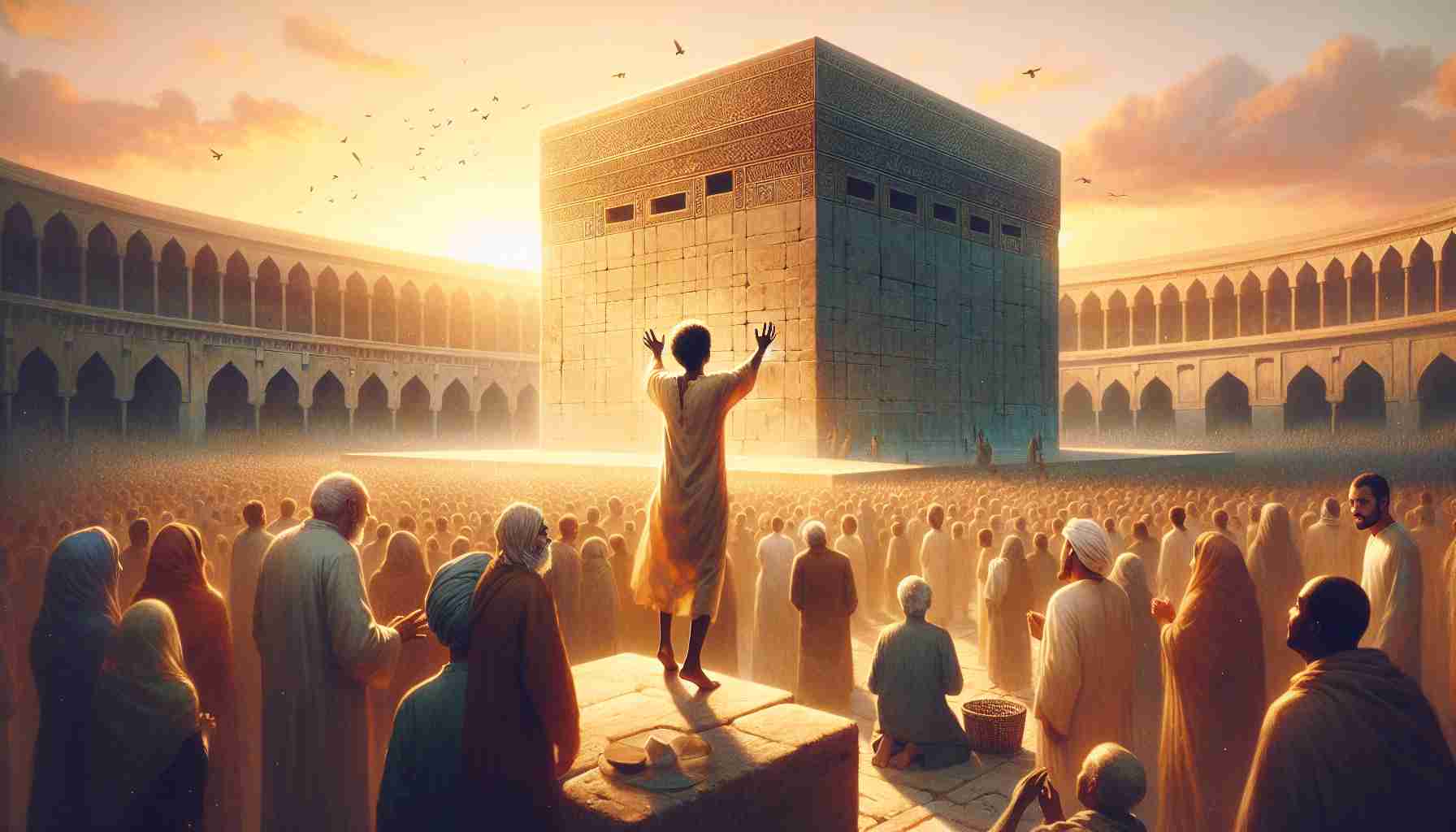

I remember the first time I heard his voice rise into the sky — strong, steady, like it had been waiting years to be freed.
I was just a boy then, hiding behind the stone wall of Masjid al-Nabawi — the Prophet’s masjid in the city of Madinah. My father worked in the marketplace, and I would run errands through the dusty streets. That morning, he sent me to carry dates to a neighbor, but my feet carried me elsewhere. I had heard people talking. “Today, Bilal will call the adhan,” they said.
Bilal ibn Rabah was once a slave in Mecca. He was known for his deep faith in Allah, even when he was tortured for repeating one word: “Ahad. Ahad.” — meaning “One, One,” because he believed in the One true God. His master had forced him to lie on scorching stones, pressing a heavy rock on his chest, but even then, Bilal’s lips only whispered that word.
After Islam spread to Madinah, and the Muslims began establishing their community under the guidance of the Prophet Muhammad ﷺ, they built the masjid. But how would people know when the prayer time had come? Some suggested a trumpet, others a bell. Then, one companion saw a dream of a man teaching the call to prayer — the adhan. When they told the Prophet ﷺ, he said it was a good dream and asked Bilal to be the first to give the call.
So there I was, crouched in silence, heart racing, when Bilal climbed the rooftop.
“Allahu Akbar, Allahu Akbar…” — “Allah is the Greatest, Allah is the Greatest…”
His voice broke through the morning calm. The sound swept over alleys, homes, and hearts. Grown men paused. Old women raised their heads. I saw tears well up in the eyes of hardened warriors. It wasn’t just a call to prayer; it was the call of a man who had once been silenced — now chosen to awaken a whole city with his voice.
I didn’t understand everything about Islam back then. But I understood this: no one had ever told me that a slave could become a leader, that suffering could become honor. Hearing Bilal's adhan that day, I realized that in Islam, faith is what lifts a person — not wealth, not tribe, not even freedom.
As Bilal’s voice echoed through the air, I whispered my own prayer — not in full Arabic yet, just clumsy words shaped by awe. I asked Allah to give me a heart as brave as his.
Years later, I heard someone say that the Prophet ﷺ once told Bilal, “I heard your footsteps ahead of me in Paradise.” That stayed with me. A man who had no riches, no title — but in faith, he was ahead of all.
Inspired by Sahih Bukhari Hadith 375 and authentic seerah narrations about Bilal ibn Rabah.
I remember the first time I heard his voice rise into the sky — strong, steady, like it had been waiting years to be freed.
I was just a boy then, hiding behind the stone wall of Masjid al-Nabawi — the Prophet’s masjid in the city of Madinah. My father worked in the marketplace, and I would run errands through the dusty streets. That morning, he sent me to carry dates to a neighbor, but my feet carried me elsewhere. I had heard people talking. “Today, Bilal will call the adhan,” they said.
Bilal ibn Rabah was once a slave in Mecca. He was known for his deep faith in Allah, even when he was tortured for repeating one word: “Ahad. Ahad.” — meaning “One, One,” because he believed in the One true God. His master had forced him to lie on scorching stones, pressing a heavy rock on his chest, but even then, Bilal’s lips only whispered that word.
After Islam spread to Madinah, and the Muslims began establishing their community under the guidance of the Prophet Muhammad ﷺ, they built the masjid. But how would people know when the prayer time had come? Some suggested a trumpet, others a bell. Then, one companion saw a dream of a man teaching the call to prayer — the adhan. When they told the Prophet ﷺ, he said it was a good dream and asked Bilal to be the first to give the call.
So there I was, crouched in silence, heart racing, when Bilal climbed the rooftop.
“Allahu Akbar, Allahu Akbar…” — “Allah is the Greatest, Allah is the Greatest…”
His voice broke through the morning calm. The sound swept over alleys, homes, and hearts. Grown men paused. Old women raised their heads. I saw tears well up in the eyes of hardened warriors. It wasn’t just a call to prayer; it was the call of a man who had once been silenced — now chosen to awaken a whole city with his voice.
I didn’t understand everything about Islam back then. But I understood this: no one had ever told me that a slave could become a leader, that suffering could become honor. Hearing Bilal's adhan that day, I realized that in Islam, faith is what lifts a person — not wealth, not tribe, not even freedom.
As Bilal’s voice echoed through the air, I whispered my own prayer — not in full Arabic yet, just clumsy words shaped by awe. I asked Allah to give me a heart as brave as his.
Years later, I heard someone say that the Prophet ﷺ once told Bilal, “I heard your footsteps ahead of me in Paradise.” That stayed with me. A man who had no riches, no title — but in faith, he was ahead of all.
Inspired by Sahih Bukhari Hadith 375 and authentic seerah narrations about Bilal ibn Rabah.